How Arrow became the best superhero show on television
With less than two seasons under its belt, the CW drama has set the template for doing a small-screen superhero right
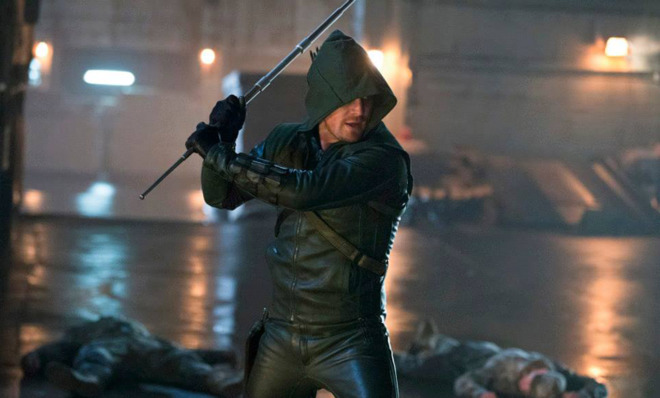
A free daily email with the biggest news stories of the day – and the best features from TheWeek.com
You are now subscribed
Your newsletter sign-up was successful
It's safe to say pop culture is in the midst of a superhero moment. Muscle-bound men crowd our multiplex screens, angsting over dead parents or lost loves before swooping in to save millions of unsuspecting citizens from bad guys laying waste to vast CGI cities.
Almost every TV network either has a hero in its roster or wants one. ABC has Agents of S.H.I.E.L.D. Fox has given Batman prequel series Gotham a series commitment for next season. Even Netflix is getting in on the action with a cluster of crossover series based on Marvel’s The Defenders.
The CW boasts Arrow.
The Week
Escape your echo chamber. Get the facts behind the news, plus analysis from multiple perspectives.

Sign up for The Week's Free Newsletters
From our morning news briefing to a weekly Good News Newsletter, get the best of The Week delivered directly to your inbox.
From our morning news briefing to a weekly Good News Newsletter, get the best of The Week delivered directly to your inbox.
But while S.H.I.E.L.D. is shedding viewers and has swiftly fallen out of critical favor, Arrow’s sophomore season is a smash hit by CW standards, garnering rave reviews and hitting series-high ratings in the 18-34 age demographic for the Dec. 4 episode, which introduced Grant Gustin as Barry Allen (the dorky scientist destined to become The Flash, possibly in a CW spin-off). Last night's midseason finale "Three Ghosts" is undoubtedly the show's strongest episode to date, with cinematic scope, breakneck pacing, multiple jaw-dropping twists, and more DC Comics Easter eggs than you can shake a particle accelerator at.
While it's by no means a perfect show, Arrow has managed to do what many series never accomplish: Actively learn from its mistakes, streamline its storytelling, and double down on what's working to ensure that each episode is stronger than the last.
How is Arrow hitting its mark each week while S.H.I.E.L.D. continues to stumble? We can think of a few reasons:
1. The cast is fantastic
A free daily email with the biggest news stories of the day – and the best features from TheWeek.com
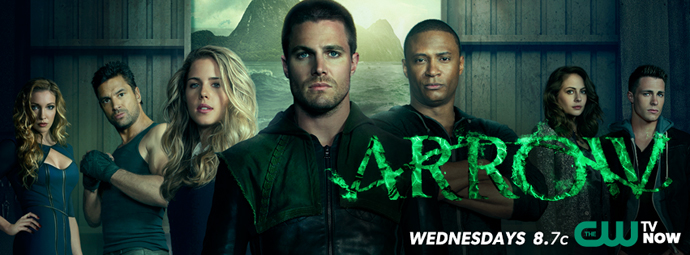
Arrow's ensemble is truly one of the most compelling on the small screen. While Stephen Amell's troubled billionaire Oliver Queen is the steely center on which the whole enterprise hangs, it's his supporting cast that really breathes life into the show.
Emily Bett Rickards and David Ramsey are magnetic as Felicity Smoak and John Diggle, Oliver's capable partners in crime-fighting — don't call them sidekicks — who remind Oliver of his humanity, help save the day, and inject the show with a much-needed dose of levity. Oliver's many relationships — with Felicity and Diggle; his mother, Moira (Susanna Thompson); his sister, Thea (Willa Holland); his first love, Laurel (Katie Cassidy); his ally on the island where he is shipwrecked, Slade (Bennett); and his dearly departed best friend, Tommy (Colin Donnell) — all serve to define both the person he is and the hero he aspires to be. Every time the show devotes time to exploring those personal bonds and contrasting dynamics the result is electrifying.
Arrow's guest stars are equally well-chosen by the producers, utilizing genre icons such as Torchwood's John Barrowman, Firefly's Summer Glau, and Doctor Who's Alex Kingston, along with lesser-known (but no less engaging) players like Caity Lotz and Celina Jade as Sara Lance and Shado. The exhaustive search for Barry Allen clearly paid dividends with the charismatic Grant Gustin, who is more than charming enough to anchor his own series.
If Arrow has any shortcoming, it's that the plot moves so quickly; there's not enough time to truly get to know this remarkable collection of characters. We have yet to gain insight into Felicity or Diggle's lives when they're not aiding Oliver, and other fascinating figures like the rebellious Roy Harper (Colton Haynes) are given short shrift when there's so much information to impart. We'll see if the rising body count and converging storylines bring some of our favorites to the fore in upcoming episodes.
2. It celebrates the superhero genre
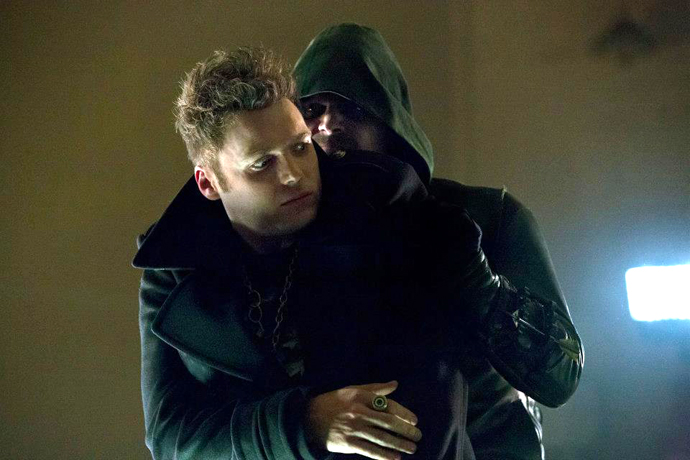
There's been an odd trend of superhero shows that almost seem ashamed of their comic book roots, because of rights issues or budgetary concerns. By contrast, Arrow unabashedly embraces its source material in a way that's undeniably thrilling for fans of the DC Universe.
Every villain who's introduced to the series goes through an "Arrowfication" of sorts to ground their more fantastical elements. (Take the show's version of Count Vertigo (Seth Gabel), who's a flamboyant drug dealer rather than a caped aristocrat with the power to dizzy his foes.) But the villains' malice remains just as potent. Fans of the Green Arrow may know better than to expect Oliver Queen to whip out a boxing glove arrow any time soon, but the show gives plenty of knowing winks to the comics canon, fleshing out Oliver's world with references to Kord Enterprises, A.R.G.U.S., Solomon Grundy, and Ra's al Ghul, to name a few.
The show is rarely campy, treating our heroes' obstacles as the life-and-death situations that they are, but it's also not afraid to lean into its more outlandish elements when appropriate. Unlike Smallville, which failed to give fans more than a glimpse of Tom Welling's Clark Kent in full Superman costume, Arrow wisely knows that its source material is its greatest strength, and fans have responded accordingly.
3. The production values are sky-high
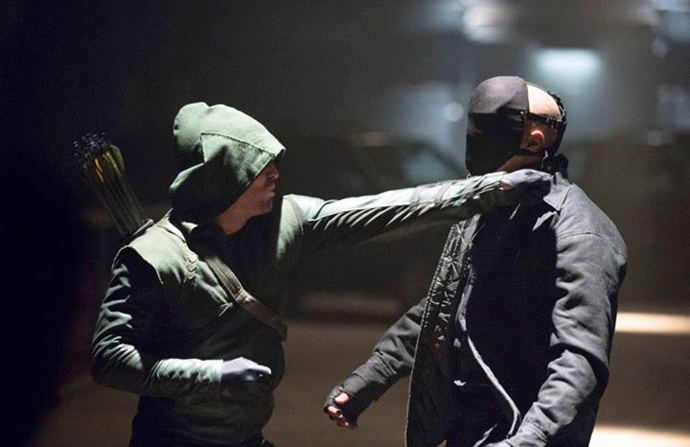
Many TV shows say that they're attempting to make a mini-movie every week, but few series actually manage to accomplish it. Arrow is one of the few that comes close, thanks in large part to its thrilling action scenes.
Unlike S.H.I.E.L.D. and Smallville, Arrow relies on practical effects more than CGI, which adds to the gritty realism of Oliver's world. And in the capable hands of the show's stunt coordinators, you feel the impact of every punch.
Aesthetically, the show takes many cues from Christopher Nolan's Dark Knight trilogy, but despite its darkness, the show is never murky: Fight scenes are clean and well-choreographed. You can actually see the people involved — a novelty in many over-edited shows these days.
4. The flashbacks are interesting

Some of the flashbacks to Oliver's time on the island of Lian Yu during the first season of Arrow felt like the show was spinning its wheels. But as the show has grown in confidence, so too have the trips to the past, which are now being used to contextualize Oliver's present-day concerns in Starling City.
Not only have the flashbacks allowed us to know and love Manu Bennett's curmudgeonly Slade Wilson and Celina Jade's Shado, they've also provided more insight into Oliver's relationship with Sara Lance, previously thought dead but recently returned as the show's first iteration of Black Canary. Since Oliver spent five years on the island, it makes sense for the show to explore the ordeal that forged him into the warrior he is today.
5. Arrow knows what — and who — it is fighting for
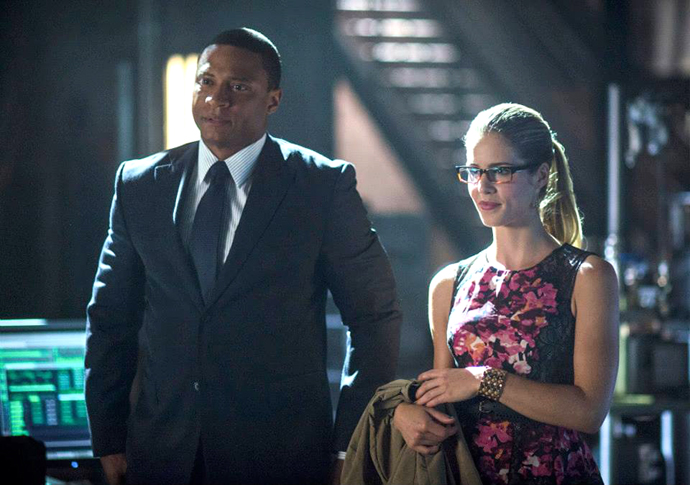
Obviously, S.H.I.E.L.D. is unable to rely on guest spots from Marvel's heavy hitters. You can name-drop Thor and Tony Stark as much as you want, but ABC doesn't have the budget to make Robert Downey Jr. a featured player.
So while both Arrow and S.H.I.E.L.D. are ostensibly about regular humans doing extraordinary things without the use of a magical hammer, ABC's series has chosen to focus on the more procedural facets of fighting evil, while Arrow has flung itself headfirst into exploring what it means to be a hero, with all the action and adventure that goes with it.
While it's possible that S.H.I.E.L.D. will find its identity in the second half of its freshman season — which was when Arrow itself truly kicked into high gear — ABC's show still seems to be floundering over what kind of show it wants to be and who its characters are. That's something that Arrow appeared to know right from the start. Oliver Queen might be a vigilante, but we trust his motives and we know that he's calling the shots. His partners in crime-fighting follow him because they believe in his cause and his moral compass, and are his friends. All of that's in stark contrast to S.H.I.E.L.D., whose characters are technically employees of a shadowy government organization whose motives can't always be trusted. A little trust goes a long way for both the characters and the audience.
In less than two years, Arrow has shown how to do small-screen superheroes right. Aside from classic cartoons like the Batman and X-Men animated series of the '90s, fans have generally had to turn to the big screen to see their favorite comic book characters translated respectfully to another medium. Fortunately, we now have Arrow's bold storytelling and comic sensibilities, which have created a new template that other wannabe heroes would be wise to emulate. Let's hope they do it.
Laura Prudom is a freelance entertainment reporter, formerly of The Huffington Post, whose work has appeared on TV Fanatic, Moviefone, Vulture, and in the pages of Signature LA Direct magazine. A devourer of all things geek, she'll happily bore you with talk of Star Wars, Batman, and the underrated masterpiece that is Flash Gordon.
-
 The Olympic timekeepers keeping the Games on track
The Olympic timekeepers keeping the Games on trackUnder the Radar Swiss watchmaking giant Omega has been at the finish line of every Olympic Games for nearly 100 years
-
 Will increasing tensions with Iran boil over into war?
Will increasing tensions with Iran boil over into war?Today’s Big Question President Donald Trump has recently been threatening the country
-
 Corruption: The spy sheikh and the president
Corruption: The spy sheikh and the presidentFeature Trump is at the center of another scandal